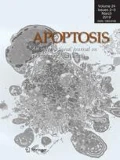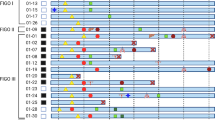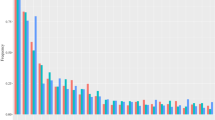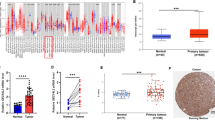Abstract
Apoptosis is known to be involved in tumorigenesis and a defective ratio between cell proliferation and apoptosis may contribute to the emergence of a malignant phenotype. Transcriptional silencing of apoptosis-related genes associated with aberrant promoter methylation may impair the apoptotic machinery, ultimately leading to cancer development. Aberrant promoter methylation of numerous genes involved in many different pathways is frequent in prostate cancer. Our aim was to quantitatively assess the methylation status of several apoptosis-related genes in prostate adenocarcinoma (PCa) and its precursor lesion, high-grade prostatic intraepithelial neoplasia (HGPIN). First, 120 PCa and 39 HGPIN were screened for altered expression of BCL2, CASP8, CASP3, DAPK DR3, DR4, DR6, FAS, TMS1, TNFR2, using 28 benign prostate hyperplasias and 10 normal prostates as controls. Underexpressed genes were then assessed by quantitative methylation-specific PCR to determine the promoter methylation status. Finally, quantitative mRNA expression of aberrantly methylated genes was performed and methylation data was correlated with standard clinicopathologic parameters. DAPK, DR4 and TNFR2 were significantly overexpressed in HGPIN and PCa, whereas BCL2, TMS1, and FAS were downregulated. Although methylation levels were significantly higher for TMS1 and BCL2 (correlating with advanced stage), an inverse correlation with mRNA expression was found only for BCL2. We concluded that the apoptotic pathways are largely preserved in prostate carcinogenesis, in particular the extrinsic pathway, with the exception of FAS and TMS1, which are epigenetically downregulated. In addition, BCL2 was also found to be frequently silenced in PCa due to aberrant promoter methylation, thus supporting a future role for apoptosis-targeted therapy in prostate cancer.




Similar content being viewed by others
Abbreviations
- QMSP:
-
Quantitative methylation-specific PCR
- qRT-PCR:
-
Quantitative reverse-transcriptase polymerase chain reaction
- BPH:
-
Benign prostatic hyperplasia
- HGPIN:
-
High-grade prostatic intraepithelial neoplasia
- PCa:
-
Prostate carcinoma
- NPT:
-
Normal prostate tissue
- ACTB :
-
Beta-Actin
- β-GUS:
-
Beta-glucuronidase
References
Bremer E, van Dam G, Kroesen BJ, de Leij L, Helfrich W (2006) Targeted induction of apoptosis for cancer therapy: current progress and prospects. Trends Mol Med 12:382–393
Ashkenazi A (2008) Directing cancer cells to self-destruct with pro-apoptotic receptor agonists. Nat Rev Drug Discov 7:1001–1012
Hector S, Prehn JH (2009) Apoptosis signaling proteins as prognostic biomarkers in colorectal cancer: a review. Biochim Biophys Acta 1795:117–129
Hanahan D, Weinberg RA (2000) The hallmarks of cancer. Cell 100:57–70
Jemal A, Siegel R, Ward E, Hao Y, Xu J, Thun MJ (2009) Cancer statistics, 2009. CA Cancer J Clin 59:225–249
Nelson WG, De Marzo AM, Isaacs WB (2003) Prostate cancer. N Engl J Med 349:366–381
Zhang XK (2002) Vitamin A and apoptosis in prostate cancer. Endocr Relat Cancer 9:87–102
Murphy TM, Perry AS, Lawler M (2008) The emergence of DNA methylation as a key modulator of aberrant cell death in prostate cancer. Endocr Relat Cancer 15:11–25
Friedrich MG, Weisenberger DJ, Cheng JC et al (2004) Detection of methylated apoptosis-associated genes in urine sediments of bladder cancer patients. Clin Cancer Res 10:7457–7465
Costa VL, Henrique R, Jeronimo C (2007) Epigenetic markers for molecular detection of prostate cancer. Dis Markers 23:31–41
Jeronimo C, Henrique R, Hoque MO et al (2004) A quantitative promoter methylation profile of prostate cancer. Clin Cancer Res 10:8472–8478
Wittekind CF, Greene FL, Hutter RVP, Klimpfinger M, Sobin LH (2005) Prostate. In: Wittekind CF, Greene FL, Hutter RVP, Klimpfinger M, Sobin LH (eds) TNM atlas: illustrated guide to the TNM/pTNM classification of malignant tumours, 5th edn. Springer, Berlin, pp 283–291
Henrique R, Jeronimo C, Hoque MO et al (2005) MT1G hypermethylation is associated with higher tumor stage in prostate cancer. Cancer Epidemiol Biomarkers Prev 14:1274–1278
Eads CA, Danenberg KD, Kawakami K et al (2000) MethyLight: a high-throughput assay to measure DNA methylation. Nucleic Acids Res 28:E32
Petak I, Danam RP, Tillman DM et al (2003) Hypermethylation of the gene promoter and enhancer region can regulate Fas expression and sensitivity in colon carcinoma. Cell Death Differ 10:211–217
Hopkins-Donaldson S, Ziegler A, Kurtz S et al (2003) Silencing of death receptor and caspase-8 expression in small cell lung carcinoma cell lines and tumors by DNA methylation. Cell Death Differ 10:356–364
de Miguel MP, Royuela M, Bethencourt FR, Santamaria L, Fraile B, Paniagua R (2000) Immunoexpression of tumour necrosis factor-alpha and its receptors 1 and 2 correlates with proliferation/apoptosis equilibrium in normal, hyperplasic and carcinomatous human prostate. Cytokine 12:535–538
Hesry V, Piquet-Pellorce C, Travert M et al (2006) Sensitivity of prostate cells to TRAIL-induced apoptosis increases with tumor progression: DR5 and caspase 8 are key players. Prostate 66:987–995
O’Neill AJ, Boran SA, O’Keane C et al (2001) Caspase 3 expression in benign prostatic hyperplasia and prostate carcinoma. Prostate 47:183–188
Gopisetty G, Ramachandran K, Singal R (2006) DNA methylation and apoptosis. Mol Immunol 43:1729–1740
Lehmann U, Celikkaya G, Hasemeier B, Langer F, Kreipe H (2002) Promoter hypermethylation of the death-associated protein kinase gene in breast cancer is associated with the invasive lobular subtype. Cancer Res 62:6634–6638
Yegnasubramanian S, Kowalski J, Gonzalgo ML et al (2004) Hypermethylation of CpG islands in primary and metastatic human prostate cancer. Cancer Res 64:1975–1986
Maruyama R, Toyooka S, Toyooka KO et al (2002) Aberrant promoter methylation profile of prostate cancers and its relationship to clinicopathological features. Clin Cancer Res 8:514–519
Zuzak TJ, Steinhoff DF, Sutton LN, Phillips PC, Eggert A, Grotzer MA (2002) Loss of caspase-8 mRNA expression is common in childhood primitive neuroectodermal brain tumour/medulloblastoma. Eur J Cancer 38:83–91
Shivapurkar N, Toyooka S, Eby MT et al (2002) Differential inactivation of caspase-8 in lung cancers. Cancer Biol Ther 1:65–69
Kim HS, Lee JW, Soung YH et al (2003) Inactivating mutations of caspase-8 gene in colorectal carcinomas. Gastroenterology 125:708–715
Barbero S, Mielgo A, Torres V et al (2009) Caspase-8 association with the focal adhesion complex promotes tumor cell migration and metastasis. Cancer Res 69:3755–3763
Collard RL, Harya NS, Monzon FA, Maier CE, O’Keefe DS (2006) Methylation of the ASC gene promoter is associated with aggressive prostate cancer. Prostate 66:687–695
Das PM, Ramachandran K, Vanwert J et al (2006) Methylation mediated silencing of TMS1/ASC gene in prostate cancer. Mol Cancer 5:28
Suzuki M, Shigematsu H, Shivapurkar N et al (2006) Methylation of apoptosis related genes in the pathogenesis and prognosis of prostate cancer. Cancer Lett 242:222–230
Masumoto J, Dowds TA, Schaner P et al (2003) ASC is an activating adaptor for NF-kappa B and caspase-8-dependent apoptosis. Biochem Biophys Res Commun 303:69–73
Krajewska M, Krajewski S, Epstein JI et al (1996) Immunohistochemical analysis of bcl-2, bax, bcl-X, and mcl-1 expression in prostate cancers. Am J Pathol 148:1567–1576
Colombel M, Symmans F, Gil S et al (1993) Detection of the apoptosis-suppressing oncoprotein bc1–2 in hormone-refractory human prostate cancers. Am J Pathol 143:390–400
Mackler NJ, Pienta KJ (2005) Drug insight: use of docetaxel in prostate and urothelial cancers. Nat Clin Pract Urol 2:92–100
Yoshino T, Shiina H, Urakami S et al (2006) Bcl-2 expression as a predictive marker of hormone-refractory prostate cancer treated with taxane-based chemotherapy. Clin Cancer Res 12:6116–6124
Kyprianou N, King ED, Bradbury D, Rhee JG (1997) bcl-2 over-expression delays radiation-induced apoptosis without affecting the clonogenic survival of human prostate cancer cells. Int J Cancer 70:341–348
Cho NY, Kim BH, Choi M et al (2007) Hypermethylation of CpG island loci and hypomethylation of LINE-1 and Alu repeats in prostate adenocarcinoma and their relationship to clinicopathological features. J Pathol 211:269–277
Catz SD, Johnson JL (2001) Transcriptional regulation of bcl-2 by nuclear factor kappa B and its significance in prostate cancer. Oncogene 20:7342–7351
Vinci S, Giannarini G, Selli C, et al. (2009) Quantitative methylation analysis of BCL2, hTERT, and DAPK promoters in urine sediment for the detection of non-muscle-invasive urothelial carcinoma of the bladder: a prospective, two-center validation study. Urol Oncol. doi:10.1016/j.urolonc.2009.01.003
Kang GH, Lee S, Cho NY et al (2008) DNA methylation profiles of gastric carcinoma characterized by quantitative DNA methylation analysis. Lab Invest 88:161–170
Santourlidis S, Warskulat U, Florl AR et al (2001) Hypermethylation of the tumor necrosis factor receptor superfamily 6 (APT1, Fas, CD95/Apo-1) gene promoter at rel/nuclear factor kappaB sites in prostatic carcinoma. Mol Carcinog 32:36–43
Betel D, Wilson M, Gabow A, Marks DS, Sander C (2008) The microRNA.org resource: targets and expression. Nucleic Acids Res 36:D149–D153
O’Kane HF, Watson CJ, Johnston SR, Petak I, Watson RW, Williamson KE (2006) Targeting death receptors in bladder, prostate and renal cancer. J Urol 175:432–438
Lee SH, Shin MS, Park WS et al (1999) Alterations of Fas (APO-1/CD95) gene in transitional cell carcinomas of urinary bladder. Cancer Res 59:3068–3072
Takayama H, Takakuwa T, Dong Z et al (2001) Fas gene mutations in prostatic intraepithelial neoplasia and concurrent carcinoma: analysis of laser capture microdissected specimens. Lab Invest 81:283–288
Acknowledgments
V.L.C and F.R.R are supported by grants from Fundação para a Ciência e a Tecnologia (SFRH/BD/23374/2005, SFRH/BPD/26492/2006, respectively). This study was funded by grants from Liga Portuguesa Contra o Cancro––Núcleo Regional do Norte, the Calouste Gulbenkian Foundation (Project # 96474) and Comissão de Fomento de Investigação em Cuidados de Saúde––Ministério da Saúde (Project. no. 25/2007). The authors are grateful to Dr. Mrinalini Honavar, M.D., for critically reading the manuscript.
Competing interests
The authors declare that they have no competing interests.
Author information
Authors and Affiliations
Corresponding author
Electronic supplementary material
Below is the link to the electronic supplementary material.
10495_2010_508_MOESM1_ESM.tif
Supplementary Fig. 1: Unsupervised hierarchical cluster analysis of the immunohistochemistry results in prostate adenocarcinomas. (TIFF 1.90 MB)
10495_2010_508_MOESM2_ESM.tif
Supplementary Fig. 2: Distribution of BCL2, TMS1, DR6 and FAS promoter methylation levels, according to Gleason score and pT category. (TIFF 918 kb)
Rights and permissions
About this article
Cite this article
Carvalho, J.R., Filipe, L., Costa, V.L. et al. Detailed analysis of expression and promoter methylation status of apoptosis-related genes in prostate cancer. Apoptosis 15, 956–965 (2010). https://doi.org/10.1007/s10495-010-0508-6
Published:
Issue Date:
DOI: https://doi.org/10.1007/s10495-010-0508-6




